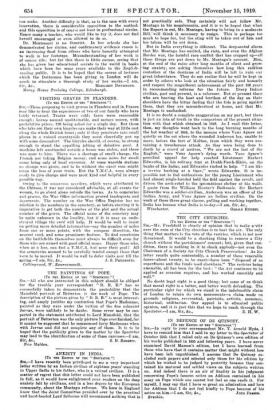ANXIETY IN INDIA.
[To THE EDITOR OF THE "SPECTATOR"] fia,—I have recently been privileged to see a very important letter written by an Indian civilian of eighteen years' standing in Upper India to his father, who is a retired civilian. It is a matter of regret that this letter could not have been published In full, as it would have enlightened your readers on the deep anxiety felt by civilians, and in a less degree by the European community, about the Montagu reforms. We here in England know that the Joint Committee presided over by the practical and hard-headed Lord Selborne will recommend nothing that is
not practically safe. They certainly will not follow Mr. Montagu in his megalomania, and it is to be hoped that when the Report is out, Mr. Montagu, having to bring in a moderate will think it necessary to resign. This is perhaps too much to hope for, but the sting will be taken out of him and his talons will be cut down.
But in India everything is different. The deep-seated alarm that Mr. Montagu has excited, the riots, and even the Afghan Border war, the hateful race conflict that has cropped up—all these things are put down to Mr. Montagu's account. Mon, at the end of the rains after long months of silent and grow- - jug anxiety, are asking themselves how long this reckless custodian of the destinies of India will be left to ruin our great inheritance. They do not realize that he will be kept in order by others who look at the situation fairly and honestly and respect the magnificent achievement of the past 150 years in recommending reforms for the future. Every Indian civilian, past and present, is a reformer. But at present these who are bearing the heat and burthen of the day on their shoulders have the bitter feeling that the tide is going against them, that they are misunderstood at home, and that Mr. Montagu is unchecked.
It is no doubt a complete exaggeration on my part, but there is just an iota of truth in the comparison of the present situa- tion with that which obtained in 1848. As I read this letter, then, my thoughts went back to the long burning months of the hot weather of 1848, to the mosque where Vans Agnew sat quietly on the cot where the wounded Anderson lay, unable to move, before the fort of Multan, from which they were sus- taining a treacherous attack. As they were being done to death by a crowd of natives, " We are not the last of the English," were Vans Agnew's dying words. Vans Agnew's pencilled appeal for help reached Lieutenant• Herbert Edwardes, in his solitary tent at Derfih-Fateh-Khan, on the banks of the Indus, and Edwardes rushed to help. "I am like a terrier barking at a tiger," wrote Edwardes. It is im- possible not to feel enthusiasm for the young Lieutenant who had almost single-handed held the field against the revolt, and driven the arch-rebel to the ignominious shelter of his walls. I quote from Sir William Hunter's Dalhousie. Sir Herbert Edwardes was a soldier-civilian, Anderson was an officer of the Indian Army, and Vans Agnew an Indian civilian. On the work of these three great classes, pulling and working together, India has become what India is to-day.—I am, Sir, &c.,






































 Previous page
Previous page